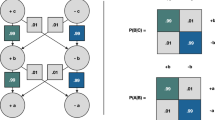Abstract
Abduction was first introduced in the epistemological context of scientific discovery. It was more recently analyzed in artificial intelligence, especially with respect to diagnosis analysis or ordinary reasoning. These two fields share a common view of abduction as a general process of hypotheses formation. More precisely, abduction is conceived as a kind of reverse explanation where a hypothesis H can be abduced from events E if H is a “good explanation” of E. The paper surveys four known schemes for abduction that can be used in both fields. Its first contribution is a taxonomy of these schemes according to a common semantic framework based on belief revision. Its second contribution is to produce, for each non-trivial scheme, a representation theorem linking its semantic framework to a set of postulates. Its third contribution is to present semantic and axiomatic arguments in favor of one of these schemes, “ordered abduction,” which has never been vindicated in the literature.
Similar content being viewed by others
References
Alchourron, C.E., Gärdenfors, P., and Makinson, D., 1985, “On the logic of theory change: Partial meet contraction and revision functions,” Journal of Symbolic Logic 50, 510–530.
Boutilier, C. and Becher, V., 1995, “Abduction as belief revision,” Artificial Intelligence 77, 43–94.
Cialdea Mayer, M. and Pirri, F., 1996, “Abduction is not deduction-in-reverse,” Journal of the IGPI 4, 1–14.
Darwiche, A. and Pearl, J., 1997, “On the logic of iterared belief revision,” Artificial Intelligence 89, 1–29.
Denecker, M. and Kakas, A., 2001, “Abduction in logic programming,” in Computational Logic: Logic Progamming and Beyond (in honour of Robert A. Kowalski), Lectures Notes in Artificial Intelligence, Springer Verlag.
Flach, P., 1996, “Rationality postulates for induction,” in TARK VI: Sixth Conference on Theoretical Aspects of Rationality and Knowledge, Morgan Kaufmann.
Flach, P. and Kakas, A., 2000, Abduction and Induction, Dordrecht: Kluwer Academic Publishers.
Harman, G.H., 1978, “The inference to the best explanation,” Philosophical Review 71, 88–95.
Hempel, C.G., 1965, Aspects of Scientific Explanation and Other Essays in the Philosophy of Science, The Free Press.
Hempel, C.G., 1988, “A problem concerning the inferential function of scientific theories,” in The Limitations of Deductivism, A. Grünbaum and W.C. Salmon, eds., University of California Press.
Kraus, S., Lehmann, D., and Magidor, M., 1990, “Non monotonic reasoning, preferential models and cumulative logics,” Artificial Intelligence 44, 167–208.
Lehmann, D. and Magidor, M., 1992, “What does a conditional base entail?” Artificial Intelligence 55, 1–60.
Levi, I., 1979, “Abduction and demands for information,” pp. 405–29 in The Logic and Epistemology of Scientific Change, I. Niinuloto and R. Tuomela, eds., Amsterdam: North Holland for Societas Philosophica Fennica. Reprinted in I. Levi, 1984, Decisions and Revisions, Cambridge University Press.
Lipton, P., 1991, Inference to the Best Explanation, Routledge.
Lobo, J. and Uzcategui, C., 1997, “Abductive consequence relations,” Artificial Intelligence, 89, 149–171.
Makinson, D., 1993, “Five faces of minimality,” Studia Logica 52, 339–379.
Makinson, D. and Gärdenfors, P., 1991, “Relations between the logic of theory change and non-monotonic logic,” pp. 185–205 in The Logic of Theory Change, A. Fuhrman and M. Morreau, eds., Springer.
Peirce, C.S., 1931–1958, in C. Hartshorne and P. Weiss, eds., Collected Papers of Charles Sanders Peirce, Harvard University Press.
Pino-Perez, R. and Uzcategui, C., 1999, “Jumping to explanations versus jumping to conclusions,” Artificial Intelligence 111, 131–169.
Poole, D., 1988, “A logical framework for default reasoning,” Artificial Intelligence 36, 27–47.
Poole, D., 1989, “Explanation and prediction: an architecture for default and abductive reasoning,” Computational Intelligence 6, 97–110.
Popper, K.R., 1959, The Logic of Scientific Discovery, Hutchinson & Co.
Rescher, N., 1978, Peirce’s Philosophy of Science: Critical Studies in his Theory of Induction and Scientific Method,” University of Notre Dame Press.
Stalnaker, R., 1968, “A theory of conditionals,” in Philosophical Quarterly Monograph Series, Vol. 2, N. Rescher, ed., Basil Blackwell.
Thagard, P., 1978, “The best explanation: Criteria for theory choice,” Journal of Philosophy 75, 76–92.
van Fraassen, B.C., 1980, The Scientific Image, Oxford: Oxford University Press.
Zwirn, D., Zwirn, H., 1996, “Metaconfirmation,” Theory and Decision 3, 195–228.
Author information
Authors and Affiliations
Rights and permissions
About this article
Cite this article
Walliser, B., Zwirn, D. & Zwirn, H. Abductive logics in a belief revision framework. J Logic Lang Inf 14, 87–117 (2004). https://doi.org/10.1007/s10849-004-2319-z
Received:
Revised:
Issue Date:
DOI: https://doi.org/10.1007/s10849-004-2319-z




